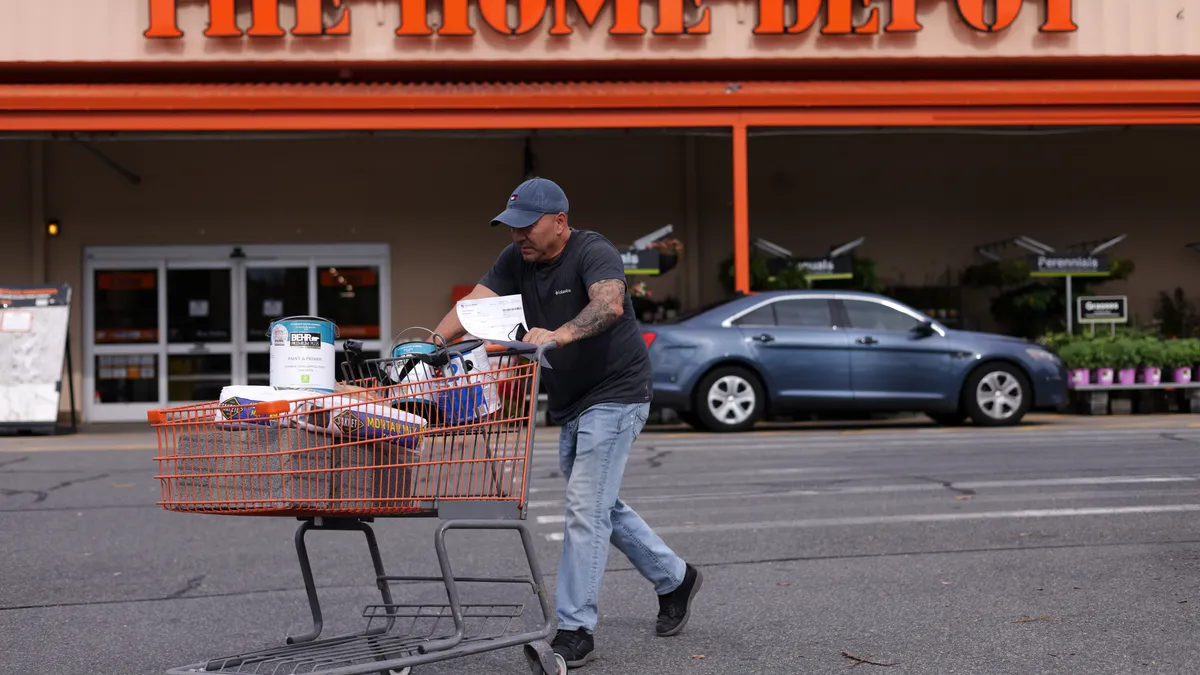Dive Brief:
- The Home Depot is prioritizing high-demand categories and chartering ships to build its inventory levels and mitigate the effects of supply chain disruptions, company executives said on the company's Q2 earnings call.
- Home Depot is making arrangements with its top suppliers to focus on the company's "highest velocity SKUs," President and COO Ted Decker said. This includes electrical and plumbing fixtures and building materials like lumber — products that cater to the company's Pro customers.
- Improving inventory depth in these SKUs helped the company increase customer transactions of more than $1,000 by 24% year over year in the second quarter, Decker said. Overall customer transactions fell 6% year over year, according to its earnings report.
Dive Insight:
Retailers are exploring different ways to build inventory to meet heightened consumer demand while enduring supply chain challenges.
Decker said raw material shortages, production constraints and transportation-related pressures have created a difficult environment to operate in.
"If retailers could find more inventory, they could sell it," National Retail Federation Chief Economist Jack Kleinhenz said in a statement.
In a Gallup survey conducted in mid-July, 60% of U.S. adults said they had been unable to buy a product in the past two months because of shortages.
To reduce the chance of missing a potential sale, some companies are narrowing their focus to their best-selling items.
- Bed Bath & Beyond's inventory levels have dropped as part of an intentional effort to cut "underperforming brands," which has led to an in-stock level of "about 95%," CEO Mark Tritton said on the company's most recent earnings call.
- Automakers are grappling with inventory challenges of their own, driven by a global shortage of semiconductors. Ford is focusing its available capacity on higher-margin vehicles, while Tesla is scaling back production of its Powerwall home battery to use parts for more car production.
- Others are locking in their own transportation capacity to avoid congestion. Walmart's restocking approach includes chartering ships to secure transportation capacity ahead of the peak season, as it tries to get its inventories back to normal levels.
Home Depot is doing all of the above: chartering ships to make inventory available as it focuses on high-sale and high-velocity SKUs.
Decker said the company saw "strength" in big-ticket purchases across Pro-centric categories such as lumber, vinyl plank flooring and pipe fittings.
"Our suppliers are working hard, but our merchants have worked with our suppliers to narrow the focus on key SKUs," CEO Craig Menear said. "And so there's opportunity still, to continue to bring more product in across the breadth of the assortment. But right now we are trying to stay focused on the things that really, really matter."
Home Depot's supply chain team also recently arranged "for several container vessels for our exclusive use," Decker said. He told CNBC in June that the company contracted a container ship for the first time in its history to keep its U.S. import activity running smoothly.
"We have a solid, contracted amount of capacity that our suppliers have largely honored," Decker told CNBC. "[It's] long-term thinking, 'Covid doesn't last forever so keep your best customers happy.'"
Decker said on the earnings call that the company's methods have paid off, "as evidenced by inventory growing faster than sales compared to the same period last year." The Home Depot saw its inventory value increase 26% year over year while its net sales saw an 8% increase year over year, per its earnings report.
"So it's been the story of two steps forward, one step back, but we are making progress," Decker said, referring to supply chain challenges. "And that's why we're happy to lean into inventory."
















